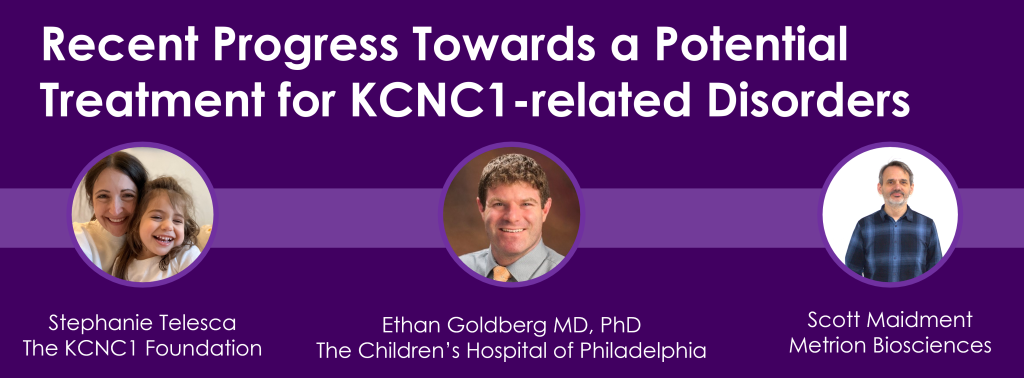In this webinar you will learn about:
Who should attend?

The KCNC1 Foundation funds research towards a treatment for the rare V434L variant in the KCNC1 gene, associated with KCNC1 developmental and epileptic encephalopathy. Metrion have been working with The KCNC1 Foundation and Perlara to help identify potential therapies by screening The Broad’s repurposed compound library collection against the Kv3.1 V434L variant.
This webinar presents the patient perspective, electrophysiological research, and technologies used as we work towards a potential treatment for KCNC1-related disorders.
Stephanie Telesca, Co-founder of The KCNC1 Foundation
Stephanie Telesca is the co-founder of The KCNC1 Foundation, mother to Eliana, and a clinical prenatal genetic counsellor. Eliana, now 3 years old, was diagnosed at 9 months with V434L in the KCNC1 gene, associated with KCNC1 developmental and epileptic encephalopathy. Following her daughter’s diagnosis, she and her husband established the only KCNC1 foundation and promptly began funding research towards a treatment, connecting with researchers, CROs, and families worldwide with the aim of providing a brighter future for all those affected with KCNC1-related disorders.
Ethan M. Goldberg, M.D., Ph.D., Associate Professor in the Division of Neurology at The Children’s Hospital of Philadelphia and in the Departments of Neurology and Neuroscience at The University of Pennsylvania Perelman School of Medicine in Philadelphia, PA, USA
Ethan Goldberg’s group performed electrophysiological characterisation of the Kv3.1 V434L variant. He will present an overview of the clinical significance of Kv3 ion channel mutations in paediatric neurology. Read Ethan Goldberg’s biography.
Scott Maidment, Head of High Throughput Screening, Metrion Biosciences
We will demonstrate how a cell line expressing the KCNC1 V434L mutation was generated and validated using biophysical and pharmacological methods, then used to screen approximately 6,800 compounds from The Broad Institute Repurposing Hub to identify inhibitors for potential use in the treatment of patients with this rare mutation.
About Ethan M. Goldberg, M.D., Ph.D
Ethan M. Goldberg, M.D., Ph.D., is Associate Professor in the Division of Neurology at The Children’s Hospital of Philadelphia and in the Departments of Neurology and Neuroscience at The University of Pennsylvania Perelman School of Medicine in Philadelphia, PA, U.S.A.. He received his undergraduate degree in Neurobiology from Harvard University; M.D. and Ph.D. in Neuroscience from NYU where he trained in the laboratory of Bernardo Rudy, M.D., Ph.D.; and general pediatric medicine, pediatric neurology, adult neurology, and neurogenetics, at The Children’s Hospital of Philadelphia and The University of Pennsylvania, with experimental epilepsy training in the laboratory of Douglas Coulter, Ph.D. Dr. Goldberg is Attending Physician and Director of the Epilepsy NeuroGenetics Initiative (ENGIN) at CHOP, the largest dedicated epilepsy neurogenetics program in the United States. He specializes in the diagnosis and care of children with complex neurological disorders including epilepsy, developmental delay/intellectual disability, and autism spectrum disorder. His biomedical research lab studies basic mechanisms of childhood epilepsy and other neurodevelopmental disorders, with a particular interest in ion channelopathies and how genetic variation in ion channel genes leads to human disease. His lab uses a range of approaches including: human and mouse genetics; ion channel, cellular and synaptic neurophysiology; pharmacology; induced pluripotent stem cell technology; cell-based therapy; behavior; computational modeling; and imaging approaches including voltage imaging and two-photon calcium imaging in awake, behaving experimental animals in vivo. Dr. Goldberg will also serve as Director of the BRIDGE (Brain Research In Development Genetics & Engineering) Center of Emphasis at the new The Morgan Center for Research and Innovation at The Children’s Hospital of Philadelphia expected to open in September 2025. Dr. Goldberg is recipient of numerous awards including the Burroughs Wellcome Fund Career Award for Medical Scientists (2014), American Society for Clinical Investigation Young Physician-Scientist Award (2017), Dana Foundation David Mahoney Neuroimaging Award (2018), March of Dimes Basil O’Connor Research Award (2018), the Grass Foundation Award in Neuroscience from the American Neurological Association (2019), and the Fritz Dreifuss Award from the American Epilepsy Society (2022), among others. Dr. Goldberg is committed to the education of diverse learners across levels of training from undergraduate to junior faculty, to the care of children and their families affected by neurodevelopmental disorders, and to the research and development of disease mechanisms, therapies, and cures.